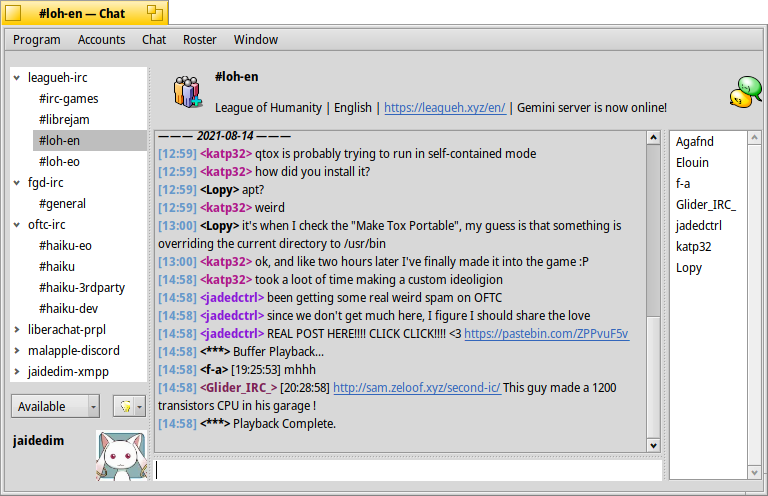If a message/event is sent to a room that's tied to a user that hasn't been formally declared (through IM_ROOM_PARTICIPANTS or IM_ROOM_PARTICIPANT_JOINED), that user won't be unconditionally kept anymore. Now, after adding an implicit user, the participant list will be requested again― upon receiving the list, all implicitly-defined users will be removed. If they really existed to begin with, they should be re-added quickly through this re-sending of IM_ROOM_PARTICIPANTS. Ghosts should be treated as ghosts, not users. |
||
|---|---|---|
| application | ||
| data | ||
| libs | ||
| locales | ||
| protocols | ||
| smileys | ||
| Contributors | ||
| License | ||
| Makefile | ||
| Makefile.common | ||
| README.ADDON.md | ||
| README.md | ||
Cardie
Cardie is a multi-protocol chat program based on Caya.
It can use native protocol add-ons and protocols supported by libpurple, the library used by Pidgin.
Protocols natively supported are:
- IRC
- XMPP
Protocols generally supported through libpurple include GroupWise, Zephyr, and others through plugins.
Building
You can make Cardie and its protocols with:
$ make
Or one-by-one:
$ make libs; make app; make protocols
Cardie itself requires the expat_devel package, the XMPP protocol requires
gloox_devel, and the libpurple add-on requires libpurple_devel and
glib2_devel― though it's worth noting that libpurple doesn't work on x86_gcc2.
License
Cardie itself is under the MIT license, but licenses vary for the included libraries and add-ons.
The xmpp and purple add-ons are under the GPLv2+, and irc the MIT license.
libsupport is under the MIT license, though containing some PD code.
librunview contains code from Vision, and is under the MPL.
libinterface is under the MIT license.

